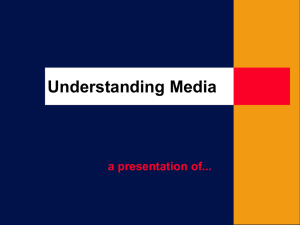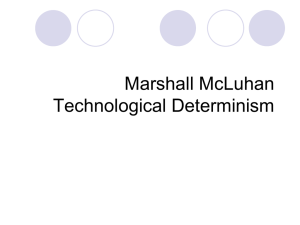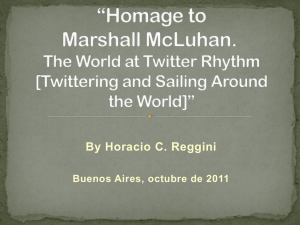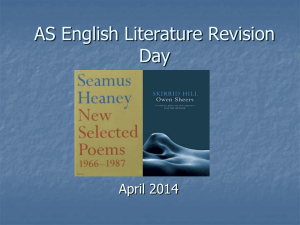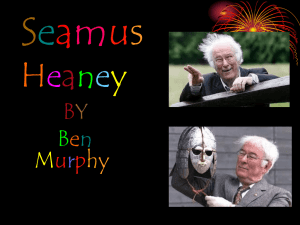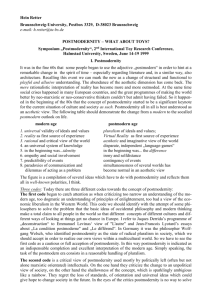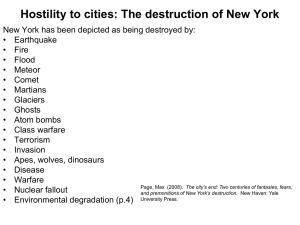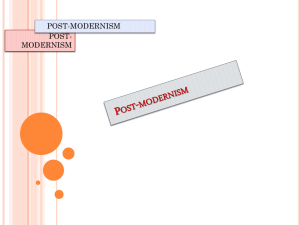Globalisation
advertisement
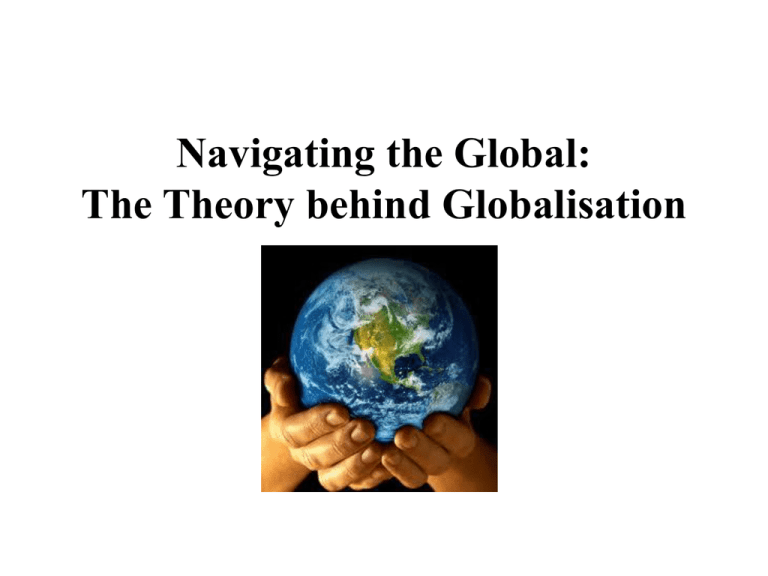
Navigating the Global: The Theory behind Globalisation OVERVIEW AIM? To learn about the basic philosophical and social theories relevant to globalisation. WHY? You are expected to be independent researchers and to use your research in your HSC exam, that is: You need to apply the following theories and ideas to the texts you are analysing. You do not need to provide footnotes or a bibliography in your essay for the HSC exam (simply use surnames) but may be required to do so in an assessment task during the year. CONNECT & EXTEND For EACH of the 8 theories, fill out 2 Post-Its: • CONNECT: What did I already know or have a vague idea about? • EXTEND: What is new information to me? THOERY 1: Claude LEVISTRAUSS 1908-2009 French anthropologist & ethnologist (study of race/ethnicity) - Changed the way the modern, Western world viewed and understood the primitive or tribal world by observing similarities between the two. - Emphasised that the "savage" mind has the same structures as the "civilised" mind & that human characteristics are the same everywhere regardless of race. - As a survival strategy, human beings fundamentally think in binary oppositions (good/bad, us vs. them) but also believe in their unification. - A family or tribe acquires its identity only through its relations with other families or tribes (this is why we marry & cross-breed). "There is today a frightful disappearance of living species, be they plants or animals. And it's clear that the density of human beings has become so great, if I can say so, that they have begun to poison themselves. And the world in which I am finishing my existence is no longer a world that I like." "The world began without the human race and will certainly end without it." 1955 How can this theory be applied to Heaney's poetry and/or The Mosquito Coast in terms of understanding the relationship between an individual and the globalised world? Examples: THEORY 2: Gayatri Chakravorty SPIVAK 1942 Indian philosopher & literary theorist - Studied post-colonialism, especially the postcolonial perspective in literature. - Interested in the often denied perspective and experience of the minor or "other" character (often repressed by the main/dominant character representing the coloniser) in a text, usually the non-white, the working class or women. Key Term: SUBALTERN someone who is socially, politically or geographically outside of the hegemonic power structure of the colony & mother country. How can this theory be applied to Heaney's poetry and/or The Mosquito Coast in terms of understanding the relationship between an individual and the globalised world? Examples: THEORY 3: Francis FUKUYAMA 1952 American/Japanese economist & political scientist - Believes the worldwide spread of liberal democracy & free market capitalism of the West & its lifetstyle may signal the end point of humanity's sociocultural evolution & become the final form of human government. - Emphasises the global triumph & universalisation of Western liberal democracy & political & economic liberalism. - This is the endpoint of man's ideological evolution. Expressed anti-Bush sentiment and disparaged the idea of America as a "super power" because it: - overstates the threat of other ideologies to the US - fails to foresee negative social reaction to the US & increases anti-Americanism - misjudges what is needed to bring peace to warring countries & is over optimistic about the success with which the social engineering of Western values can be applied to other countries How can this theory be applied to Heaney's poetry and/or The Mosquito Coast in terms of understanding the relationship between an individual and the globalised world? Examples: THEORY 4: Pierre BOURDIEU 1930-2002 French sociologist, anthropologist & philosopher - Studied dynamics of economic power relations in social life. - Emphasised the role of economic capital in social positioning. - Rejected the idea of one form of "high intelligence" or an "intellectual prophet" as he believed judgments of intellectual taste are related to one's social position or are themselves acts of social positioning. When reading an individual (in real life or in a narrative) we must consider not only: - the subjective experience of the individual but also - the external social structure present at the time. Key Term: CULTURAL CAPITAL - non-financial social assets that promote social mobility beyond economic means, e.g. education, intellect, style of speech, dress, physical appearance, gender, health, family dynamic, demography, geography, race, ethnicity, environment, attitude - accumulated cultural knowledge that confers: power + status = success 3 types of cultural capital: Embodied: both consciously acquired and passively inherited, e.g. one's attitude toward education, work and travel Objectified: physical objects/possessions, e.g. money, house, food, car (owning a Mercedes or BMW is (or used to be) a status symbol) Institutionalised: academic or other credentials/qualifications How can this theory be applied to Heaney's poetry and/or The Mosquito Coast in terms of understanding the relationship between an individual and the globalised world? Examples: POSTMODERNISM - Fredric Jameson - Marshall McLuhan - Jean-François Lyotard - Jean Baudrillard Key Terms Postmodernism: a cultural movement following that of modernism. It is thought to have emerged after WWII although some argue it didn't emerge until the 1980s. Postmodernity: the state or condition of being postmodern – after or in reaction to that which is modern, as in postmodern art, for example. Modernity is defined as a period or condition loosely identified with the Progressive Era, the Industrial Revolution, or the Enlightenment. - One "project" of modernity is said by to have been the fostering of progress by incorporating principles of rationality and hierarchy into public and artistic life. Postmodernism seeks to question, challenge or reject that. - Lyotard understood modernity as a cultural condition characterised by constant change in the pursuit of progress. Postmodernity then represents the culmination of this process where constant change has become the status quo (the norm) and the notion of progress has become obsolete. - Those who generally view modernity as obsolete or an outright failure, a flaw in humanity's evolution leading to disasters like the Holocaust and atomic bombing of Hiroshima/Nagasaki, see postmodernity as a positive development. Postmodernity is a condition or a state of being associated with changes to institutions and conditions and with social and political results and innovations, globally but especially in the West since the 1950s. Postmodernism is an aesthetic, literary, political or social philosophy, the "cultural and intellectual phenomenon", especially since the 1920s' new movements in the arts. - Both of these terms are used by philosophers, social scientists and social critics to refer to aspects of contemporary culture, economics and society that are the result of features of late 20th century and early 21st century life, including the fragmentation of authority and the commoditisation of knowledge (where knowledge becomes a commodity). - The postmodern period has had diverse political ramifications: its "anti-ideological ideas" appear to have been positively associated with the feminist movement, racial equality movements, gay rights movements, most forms of late 20th century anarchism and even the peace movement as well as various hybrids of these in the current anti-globalisation movement. - The first phase of postmodernity overlaps the end of modernity. Television became the primary news source, manufacturing decreased in importance in the economies of Western Europe and the United States but trade volumes increased within the developed core. - In 1967-1969 a crucial cultural explosion took place within the developed world as the baby boom generation, which had grown up with postmodernity as their fundamental experience of society, demanded entrance into the political, cultural and educational power structure. - A series of demonstrations and acts of rebellion ranging from non-violent and cultural, through to violent acts of terrorism - represented the opposition of the young to the policies and perspectives of the previous age. - Opposition to the Algerian War and the Vietnam War, to laws allowing or encouraging racial segregation and to laws which overtly discriminated against women and restricted access to divorce, increased use of recreational drugs, the emergence of pop cultural styles of music and drama, and the ubiquity of stereo, television and radio, helped make these changes visible in the broader cultural context. - The second phase of postmodernity is defined by "digitality" - the increasing power of personal and digital means of communication including fax machines, modems, cable and high speed internet via computers and mobile phones, which has altered the condition of postmodernity dramatically: digital production of information allows individuals to manipulate virtually every aspect of the media environment. - This has brought producers into conflict with consumers over intellectual capital and intellectual property and led to the creation of a new economy whose supporters argue that the dramatic fall in information costs will alter society fundamentally as we become a more participatory culture (e.g. Wikipedia, WikiLeaks). THEORY 5: Fredric JAMESON 1934 Literary critic & Marxist political theorist - Described the postmodern movement as the reshaping of culture under the pressure of organised capitalism & as “the cultural logic of late capitalism”. - Saw postmodern architecture, film, storytelling and art as pastiche (a hodge-podge collage) & as evidence of a crisis in finding meaning & historicity (accuracy in the retelling of history). - Rejected a moralistic opposition to postmodernism as the movement is historically grounded. How can this theory be applied to Heaney's poetry and/or The Mosquito Coast in terms of understanding the relationship between an individual and the globalised world? Examples: THEORY 6: Marshall McLUHAN 1911-1980 Canadian philosopher of communication & media theory - In the early 1960s, McLuhan wrote that the visual, individualistic print culture would soon be brought to an end by what he called “electronic interdependence”: when electronic media replace visual culture with aural/oral culture. - In this new age, humankind will move from individualism and fragmentation to a collective identity, with a “tribal base”. McLuhan's coinage for this new social organization is the “global village”. - Key to McLuhan's argument is the idea that technology has no moral bent - it is a tool that profoundly shapes an individual's and, by extension, a society's self-conception and realisation. - For instance, McLuhan contrasts the considerable alarm and revulsion that the growing quantity of books aroused in the latter 17th century with the modern nostalgic concern for the “end of the book”. - If there can be no universal moral sentence passed on technology, McLuhan believes that “there can only be disaster arising from unawareness of the causalities and effects inherent in our technologies.” - Though the Internet was invented 10 years after his death, McLuhan eerily prophesied the web technology seen today as early as 1962: “The next medium, whatever it is - it may be the extension of consciousness - will include television as its content, not as its environment, and will transform television into an art form. A computer as a research and communication instrument could enhance retrieval, obsolesce mass library organisation, retrieve the individual's encyclopedic function and flip into a private line to speedily tailored data of a saleable kind.” - McLuhan emphasised the results of living in a media culture and argued that participation in a mass media culture both overshadows actual content disseminated and is liberating because it loosens the authority of local social normative standards. How can this theory be applied to Heaney's poetry and/or The Mosquito Coast in terms of understanding the relationship between an individual and the globalised world? Examples: THEORY 7: Jean-Francois LYOTARD 1924-1998 French sociologist, philosopher & literary theorist - Interested in postmodernism and the narrative (story telling). - Rejected the universal, all encompassing "grand theories" of e.g. Marx & Freud. Key Term: GRAND NARRATIVE Rejected "grand narratives" in their attempt to explain life, history & existence, e.g. 'the progress of history', the knowability of everything by science, the striving for 'world peace' and 'absolute freedom', the 'story of mankind'. - These grand narratives are not adequate or realistic enough to represent and contain us. - No one agrees on what is real & why we are here, rather that everyone has their own perspective & unique story. - In the 20th & 21st centuries we are alert to this difference & diversity & more progressive societies value this diversity. - But... - This can result in chaos in the form of a collapse of ethics (this is why we have laws & the concept of justice). - Lyotard acknowledged that universality is a condition for something to be a properly ethical statement, e.g. "Thou shall not steal" is only ethical if it rests on universal acceptance. - Also a fan of Romantic and Modernist art, especially that which shows the human being encountering the sublime world. Key Term: SUBLIME the experience of awe and pleasurable anxiety that we experience when confronting wild and threatening sights in nature, e.g. bungee jumping off a cliff, experiencing a thunder storm, walking near a volcano. - Immanuel Kant (German philosopher, 1724-1804) established this idea of the sublime. He described it as a clash between our reason and imagination. - When experiencing the sublime there is an element where we know we're probably not in actual, life-threatening danger. - Lyotard viewed it as a crisis when we lose this ability to appreciate the sublime. How can this theory be applied to Heaney's poetry and/or The Mosquito Coast in terms of understanding the relationship between an individual and the globalised world? Examples: THEORY 8: Jean BAUDRILLARD 1929-2007 French sociologist & philosopher - Studied the way technological progress affects social change including consumerism, gender relations & understanding of history & science. Key Term: HYPERREALITY The (human) subject may try to understand the (nonhuman) object, but because the object can only be understood according to what it signifies (and because the process of signification immediately involves a web of other signs from which it is distinguished) this never produces the desired results. - Believed societies are always searching for a sense of meaning or a "total" understanding of the world that remains elusive. The excessive, fruitless search for total knowledge leads almost inevitably to a kind of delusion or hyperreality. - This is not to say that the world becomes unreal, but rather that the faster and more comprehensively societies begin to bring reality together into one supposedly coherent picture, the more insecure and unstable it looks and the more fearful societies become. Reality, in this sense, "dies out". - Meaning or value meaning is created through difference - through what something is not (so "dog" means "dog" because it is not "cat" & one thing's prestige relates to another's mundanity). - Meaning is therefore self-referential and one thing or object's meaning is only understandable through its relation to the meaning of other things. - The excess of signs and of meaning in late 20th century "global" society had caused (paradoxically) an effacement of reality. - In this world neither liberal nor Marxist utopias are any longer believed in. We live, not in a "global village", but rather in a world that is ever more easily petrified by even the smallest event. - Because the "global" world operates at the level of the exchange of signs and commodities, it becomes ever more blind to symbolic acts such as terrorism. - The symbolic realm is seen as quite distinct from that of signs and signification. Signs can be exchanged like commodities; symbols, on the other hand, operate quite differently: they are exchanged like gifts, sometimes violently. - The "global" society is without this "symbolic" element and is therefore symbolically (if not militarily) defenseless against acts such as the September 11 2001 terrorist attacks against the US and its military establishment. Sign (how does it affect me?): e.g. Sep. 11 was interpreted by the Western media as: “this means war” in the form of “East vs. West” Symbol (why was this action committed & what does it mean?): ???......................... - Baudrillard criticised Marx's economic concept of value as mere "use". Instead, proposed 4 ways of an object obtaining value: 1. The functional value of an object: its instrumental purpose, e.g. a pen writes, a refrigerator cools. 2. The exchange value of an object: its economic value, e.g. 1 pen may be worth 3 pencil, 1 refrigerator may be worth the salary earned by 3 months of work. 3. The symbolic value of an object: a value that a subject assigns to an object in relation to another subject, e.g. a pen might symbolise a student's school graduation gift or a commencement speaker's gift; a diamond may be a symbol of publicly declared marital love. 4. The sign value of an object: its value within a system of objects, e.g. a particular pen may, while having no added functional benefit, signify prestige relative to another pen; a diamond ring may have no function at all, but may suggest particular social values, such as taste, class or status. How can this theory be applied to Heaney's poetry and/or The Mosquito Coast in terms of understanding the relationship between an individual and the globalised world? Examples:
